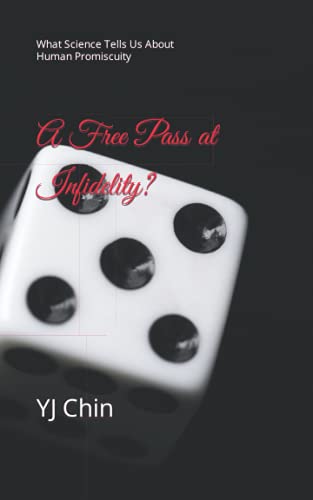This title is currently out of stock. Leave us your email address, we’d let you know when it’s in stock again!
-

A note on book covers: while we do our best to ensure the accuracy of cover images, ISBNs may at times be reused for different editions of the same title which may hence appear as a different cover.
A Free Pass At Infidelity?: What Science Tells Us About Human Promiscuity
A Free Pass At Infidelity?: What Science Tells Us About Human Promiscuity
Couldn't load pickup availability
Excerpt from the “Research material for my current project. Good to have a latest feel of the public pulse on the subject of infidelity,” Beth had thought when she came across the magazine on the shelf two days ago while browsing at her usual bookshop. She had a commission to write an essay on Genetics and Infidelity. That was just the current working title...
What piqued Beth's interest to take on the commission in the first place? Is she hoping for a cop-out? Surely, it's not because of her duplicitous extra-marital affair with a married man? This has already blown up in their faces despite the initial attempt to keep it a secret, engendering the countless concomitant lies. What Beth discovers from her project will influence the decisions she (and the voices in her head) makes. How will her life change? And the lives of the people around her? Even beyond to a seemingly random someone like Faye, an ambitious psychotherapist, unrelated at all to any of them.
Another excerpt from the
For couples who have been together long enough, we do not really think about the other very much after some time. There is always time for this later, we tell ourselves—lulled into familiarity, consumed by exigencies—we believe time is on our side, and we count on what was would still be around when we have the time. However, this change dramatically, when one is leaving the other—in some cases, after one has left the other—and we wonder about the other more. Now, Mei’s recollection flooded her brain, jolted out of familiarity by an exigency. Time is by your side only for that infinitesimal moment that you have it—coming at you and leaving you all at once. Neither a friend nor a foe, it is on nobody’s side actually. Presently, her every thought was rushing in, as if trying to slow, if not stop altogether, the grains of fine sand in the conjured hourglass from running out.
The novel interweaves a web of love stories that touches on the human condition in different relationship settings—marital/extra-marital, parent/child, and professional/client. Invariably, these encompass love and conflict, pain and loss (in its various forms) and the search for closure including situations where none seems to be forthcoming. Equally, chance and time play crucial roles in how these relationships develop and hold together.
The stories bring to life some of the ideas espoused by the Nobel laureate Daniel Kahneman in his book "Thinking, Fast and Slow". These ideas concern human rationality and behaviour (like self-control and intuition), decision making and memory. How these are influenced by the fast mind—the autonomic or unconscious part of the brain—and the slow thinking brain—its cognitive or conscious part. Naturally, the human brain is the invisible protagonist in the story. The exposition of these ideas are sometimes presented as a multiplicity of voices interacting in the heads of the characters in the stories.
Other key ideas espoused include how time, chance or randomness, and memory contribute to happenstance in relationships actually. The novel questions also if nature (as in genetics and neurochemistry) affects how relationships happen and play out. How so? As a subtext, it asks if human freewill truly exists.
Details of Book
Related Collections:
A note on book covers: while we do our best to ensure the accuracy of cover images, ISBNs may at times be reused for different editions of the same title which may hence appear as a different cover.

-
One Line Summary
Explores scientific insights into human promiscuity and relationships.
-
Who is this book for?
This book offers a fascinating look at the science behind why we act the way we do in love and fidelity. It’s especially intriguing if you’re interested in psychology, genetics, or the human mind, as it dives into the subconscious influences and the role of chance in our relationships. Readers who enjoy thoughtful explorations of human nature will find this both enlightening and compelling.

